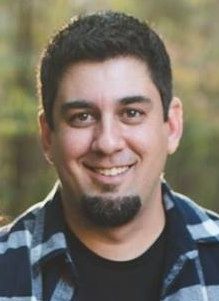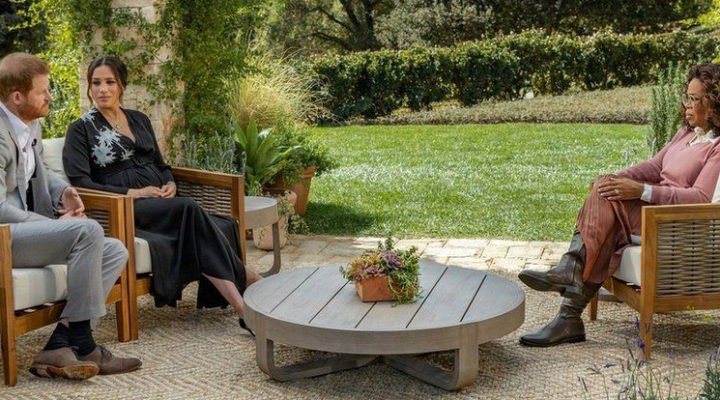As Bishop Curry spoke about the power of love during Prince Harry and Meghan Markle’s royal wedding in 2018, having recently joined the Anglican Communion myself, my heart was full. But when I watched Oprah’s interview with Harry and Meghan last week, I was stunned at the parallels between Harry and Meghan’s experience within “the institution” and the experience of many within the institutional church.
There are some like Beth Moore, who recently departed from the Southern Baptist Convention, who hold onto their conservative Christian faith while having to leave a specific denomination over any number of abuse-related issues. Others, such as Esau McCaulley, grow weary over having to argue over the same racist abuse of Black preachers that happened in the SBC and the Presbyterian Church in America and happening now in the Anglican Church in North America.
Others, such as popular comedians Rhett McLaughlin and Link Neal, leave Christianity altogether for hopeful agnosticism. And there are many non-celebrities who have suffered so severely at the hands of the church who spiritually quarantine in silence.
“I was stunned at the parallels between Harry and Meghan’s experience within ‘the institution’ and the experience of many within the institutional church.”
My entire life, I have heard evangelicals longing for the next great awakening when the masses will have their eyes opened and come weeping through their doors in repentance. But the next great awakening already is here. It’s happening with those who are already in the church doors. We are awakening to the harm of hierarchy. And like Harry and Meghan, we weep as we walk out the doors.
‘You were marrying a 1,200-year-old institution’
Many of us remember the fairytale wedding as our first experience watching a Disney movie happen in real time. As Meghan and Oprah reflected back on that day, Meghan admitted: “This wasn’t our day. This was a day that was planned for the world.” Oprah responded, “You were marrying a 1,200-year-old institution.”
It’s easy for us to forget that the church is a 2,000-year-old institution. It’s not merely a local assembly with a brand. As soon as John the Beloved died around A.D. 90, the apostles who had known Jesus no longer were alive. So the church turned to the bishops, who were concerned about establishing their authority over the churches. As the years went on and the church married the empire, the lure of hierarchy grew stronger until it broke apart and became the fractured institution we see today. When we join the 2,000-year-old institution, we’re marrying into that family. And we’re constantly reminded that it’s not about us, but about what God is doing in the institution.
Of course, evangelicals do enjoy a family atmosphere in many churches as they gather in homes throughout the week with friends and hang out on Sundays before and after the services. I look back on many of those memories with gratitude. They often take care of one another when one of them is in need. But as Meghan said: “It’s a family business, right? So there’s the family. And then there’s the people who are running the institution.”
‘When the perception and the reality are two very different things’
My wife and I had moved across the country to help start a church with two other couples. As the church grew, most people assumed we were all best friends. Five years later, our pastor was getting divorced, had to step down, but was trying to control the church leaders behind the scenes, and was spreading false accusations and making threats against anyone who didn’t succumb to his control. One Sunday morning, he came up to the stage to put his arm around me and tell everyone that there was nothing between us. And I stood there feeling like I had to smile for the sake of the institution.
“We left with our reputations tarnished over false accusations that he began spreading about us.”
When we had no choice but to leave, we were absolutely stunned. We left with our reputations tarnished over false accusations that he began spreading about us. It wasn’t until a year later that we began hearing from many others within the congregation who began to realize that perception and reality were two different things after the pastor informed them that he was stepping back in.
Meghan told Oprah, “When the perception and the reality are two very different things … there’s no way to explain that to people.” Later she said, “We just did everything we could to protect” the institution.
This is a real struggle for many of us who leave churches. The abuse we see behind the scenes is unspeakably awful. Yet, we must worship with a smile, or as Meghan put it, “Our job was to be on and to smile.” If we talk about the abuse publicly, we’re seen as bitter and dividing the body of Christ. So many of us simply walk away silently. And as the victims of hierarchy pile up, we’re left wondering if we should have outed the institution to protect its silenced victims.
‘Were you silent, or were you silenced?’
As Meghan revealed their requirement to be silent in the face of abuse, Oprah asked her, “Were you silent, or were you silenced?”
Any woman who is a part of a conservative complementarian church is being silenced. If they’re ever allowed into an elder meeting, they are to be silent unless called upon. They are never to preach. In many cases, they can’t even teach Sunday school to boys over the age of 12. And sadly, many of them are so overtaken with this abuse that they feel they have to use the Bible to defend it as well.
“Any woman who is a part of a conservative complementarian church is being silenced.”
Walking through their chicken coup, Meghan recalled watching The Little Mermaid after their wedding and reflected: “She falls in love with a prince. And because of that she has to lose her voice.” For millions of women, the choice to fall in love with the Prince of Peace is the choice to obey the hierarchy and lose their voice. But like Ariel, it’s time for them to get their voices back.
Of course, complementarian evangelicalism doesn’t see silencing women as abuse, but as protection. They believe the man must be in charge of his wife and kids in all things because the man can protect them. Similarly, Meghan told Oprah, “I did anything they told me to do … because it was also through the lens of, ‘And we’ll protect you.’”
When non-evangelicals look into this world, they’re often rightfully mortified and concerned for their evangelical friends. But those who are trapped in the institution simply are not aware that there is a systemic problem. Meghan responded to her friends’ concerns by observing, “Because I didn’t see it, I’d go, ‘Don’t worry. I’m being protected.’”
‘I needed to go somewhere to get help … . And I was told that I couldn’t’
As the abuse piled up and Meghan had to suffer in silence, she began to sink deeper into loneliness. The loneliness led her to question her desire to live because she figured the burden of who she had become was too inconvenient for the Institution. She recalled “begging for help, but nothing was ever done.” She was told that seeking help from a mental health professional “wouldn’t be good for the institution.”
 Many evangelical churches also prohibit seeking help from mental health professionals. I was taught that to see a therapist would be to deny the sufficiency of Scripture as our rule of faith and practice for all things, the sufficiency of Christ as the Savior of a few things, and the sufficiency of faith for spiritual growth. We even labeled any Christian who recommended seeing mental health professionals as “integrationists,” a term meant to foster fear.
Many evangelical churches also prohibit seeking help from mental health professionals. I was taught that to see a therapist would be to deny the sufficiency of Scripture as our rule of faith and practice for all things, the sufficiency of Christ as the Savior of a few things, and the sufficiency of faith for spiritual growth. We even labeled any Christian who recommended seeing mental health professionals as “integrationists,” a term meant to foster fear.
Instead, we were given a 2-by-3.5-inch card full of Bible verses for every struggle our white male pastors could imagine, a constant stream of books to buy from the most popular mostly white male pastors, and biblical counseling from someone who claimed that every mental health struggle could be solved by believing the evangelical theology that we are wicked enemies of God whom God should torture forever but plans to save by the grace of torturing and looking at Jesus instead.
The result is that evangelicalism is full of abused, invisible, lonely people suffering in silence who aren’t even aware of the depths of their pain.
‘I was trapped, but I didn’t know I was trapped’
As Prince Harry joined Meghan, he began to share with Oprah the extent of the institution’s control, saying: “I was trapped, but I didn’t know I was trapped. Trapped within the system, like the rest of my family are. My father and my brother, they are trapped. They don’t get to leave. And I have huge compassion for that.”
The father and family wounds for those of us who leave the church are raw and real. We feel a freedom and internal peace we never had before. We tire of being confronted and seen as dangerous outsiders. And yet, we see our families and friends remain trapped in an institution in ways they aren’t even aware of.
Regarding his own father wounds, Harry said: “There’s a lot to work through there. I feel really let down because he’s been through something similar. He knows what pain feels like. And Archie’s his grandson. But at the same time, of course, I will always love him. But there’s a lot of hurt that’s happened. And I will continue to make it one of my priorities to try and heal that relationship. But they only know what they know … or what they’re told. And I’ve tried to educate them through the process that I have been educated.”
“In our exile, we become aware of the wounds of those on the outside.”
In our exile, we become aware of the wounds of those on the outside. We begin learning of the pain of women, Black and brown people, and our LGBTQ friends at the hands of the institution. Yet, when we try to expose the abuse that caused these wounds, our evangelical friends look at us in almost total bewilderment and denial.
Regarding the racism of the institution, Harry said: “I wasn’t aware of it to start with. But my God, it doesn’t take very long to suddenly become aware of it.” Looking at Meghan, he continued, “It takes living in her shoes … for a day … to see where it was going and how far they were going to take it and get away with it and be so blatant about it.”
‘Here you have one of the greatest assets to the Commonwealth that the family could have ever wished for’
The first time my wife and I ever saw a woman preach in person was a very moving moment for us. Seeing her stand at the pulpit, take a breath, and begin to preach felt like a healing balm. My wife later recalled, “I didn’t know how much it would mean to see someone like me up there.”
All around the Commonwealth, little girls and women of color could see Meghan in her place of honor and privilege and feel an internal sense of possibility that wasn’t there before. Meghan told Oprah: “I know how important representation is. I know how you want to see someone who looks like you in certain positions.”
For those who are oppressed, this desire is not a grasping for power, but a deeply human desire to be seen and valued. And the church has no idea the healing that could take place if they allowed those that have been marginalized to be seen, heard and valued.
‘There is a level of control by fear that has existed for generations’
Controlling fathers give birth to fear in their children, who grow up to become insecure adults who control their children and continue the cycle. Harry explained, “There’s a level of control … because they’re fearful of what the papers are going to say about them.”
“Evangelicals are obsessed with the fear of what the mainstream media thinks of them.”
If there’s anything the last four years have taught us, it’s that evangelicals are obsessed with the fear of what the mainstream media thinks of them. Donald Trump tapped into this fear of the media and fanned its flame until it breached the Capitol. With televisions tuned into Fox News, children grow up hearing the likes of Tucker Carlson confirming the fears their fathers instill in them.
And the wounds of Christ’s body continue to bleed 2,000 years after the cross.
‘Life is about storytelling’
As Harry and Meghan look forward to their new life outside the institution, they plan to tell the stories of the marginalized. Meghan dreams: “Life is about storytelling, about the stories we tell ourselves, the stories we’re told, what we buy into. And for us to be able to have storytelling through a truthful lens, that hopefully is uplifting, is going to be great knowing how many people that that can land with, and being able to give a voice to a lot of people that are underrepresented and aren’t really heard.”
When my wife and I finally walked away from the institutional church we had known, it wasn’t ultimately due to the wounds we personally had suffered. It became about the wounds we could see being passed down to our children, to women, to people of color and to the LGBTQ community through the stories being told to them and over them by the church. We simply could not remain in that system knowing how so many people were suffering from it.
‘Something that I never was able to do when I was young’
As Prince Harry reflected on their new life as a family, he said: “The highlight for me is sticking him (Archie) on the back of a bicycle in his little baby seat and taking him on these bike rides, which is something that I never was able to do when I was young. I can see him on the back. And he’s got his arms out … and I think to myself, ‘Wow.’”
I have no idea what spiritual community will look like for my family long term. But for now, we are beginning to have tastes of experiences with our kids that we never had when we were young. We’re beginning to see their arms freed in childlike innocence to feel the wind. And like Harry and Meghan, we move through grief of all that’s been lost to see the beauty of all that this is and think, “Wow.”

Rick Pidcock
Rick Pidcock is a stay-at-home father of five kids. He and his wife, Ruth Ellen, have started Provoke Wonder, a collaboration of artists that exists to foster child-like worship through story and song. Provoke Wonder’s first album, Consider the Stars, was released in March 2020. Their first children’s book, What If, will be released soon. Rick is pursuing a master of arts degree in worship from Northern Seminary.


